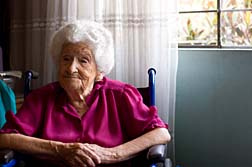 Or worse—because the facility thinks it can earn more revenue for the bed from a more well-heeled source.
Or worse—because the facility thinks it can earn more revenue for the bed from a more well-heeled source.A relocation can have a traumatic effect on an elderly resident. Take the case of Louis VanderLinde, a retired college professor stricken with Alzheimer's disease. His wife was given 30 days to find a new home for her husband because, according to a spokesperson for the Maples—a county-owned nursing home in Frankfort, Michigan—noted that the facility did not have a dedicated Alzheimer's unit and was no longer in a position to care for him.
However, it has been reported that Maples knew of VanderLinde's condition when they admitted him three years before. And when VanderLinde's wife was unable to find a suitable replacement home for him, the Maples allegedly drove the stricken man 160 miles to another facility that, like the Maples, did not have a dedicated Alzheimer's unit.
Mr. VanderLinde did not handle the eviction, and the new surroundings, well. It has been reported that he fell within a half-hour of his arrival, and soon came down with pneumonia after inhaling his food at meals. He died October 12th of last year. "You could see the panicky look in his eyes, everything was strange," his wife told the Wall Street Journal. "It's a terrible thing to live through."
What is particularly galling is the suggestion that such evictions are all about money. A nursing home, or chronic care facility will realize larger amounts of revenue from the families of residents who are financially solvent and will pay for much of the care out-of-pocket, or in concert with private health insurance and / or Medicare.
However, there's a lot less money coming from Medicaid residents, which was how Mr. VanderLinde was funding his care. It has been reported that roughly two-thirds of residents who remain in a nursing home for 90 days or longer depend on Medicaid, due to the high cost of care. For many, personal savings are exhausted early.
However, nursing homes and long-term care facilities have found a way to increase their coffers by setting up recovery and rehabilitation units designed to accept patients coming out of hospital. Such patients, it is said, qualify for Medicare benefits—and the Medicare rate is a lot higher than Medicaid: on average, $411 per resident per day from Medicare, vs. $166 for Medicaid.
Medicaid rates are established separately by individual States, and collectively fell short by $4.4 billion when compared with the actual costs associated with caring for those same Medicaid patients.
It would appear as if chronic care facilities are trying to save their financial lives on the backs of the frail—suggesting that it may be time for government to step in. But first, the Feds would have to track evictions nationwide, and that isn't even done. However, based on formal complaints with regard to nursing home discharge practices, evictions appear to have doubled to 8,500 by 2006, the last year figures are available.
The chronic-care industry maintains that evictions are uncommon, and are done only as a last-resort for specific reasons, of which there are six that the industry basically adheres to based on Federal law, enforced by individual States, governing involuntary evictions: well enough to go home, failure to pay, needed care only available elsewhere, endangerment of the health of others, endangerment of the safety of others, or if the facility closes its doors.
The latter appeared to be the case when Lodi Memorial Hospital, a not-for-profit facility in Lodi California, notified its 13 sub-acute residents that it was closing for renovations. The residents in question were mostly dependant on ventilators or feeding tubes, or other conditions requiring significant care.
However, in deference to what it told its residents, Lodi is reported to have told the State that it wanted to replace the long-term, sub-acute patients with shorter-term patients recently discharged from hospital. Such patients deliver a higher, daily rate from private health insurance or by Medicare—the latter paying for up to 100 days in a nursing home following a stay in hospital of at least three days.
Thus, the facility improves its bottom line, and 13 residents are left out in the cold.
Well, not completely. They're moved to another facility, referred to by critics as 'being dumped', and often much farther away from family. It creates a hardship for both sides.
It should be noted that Lodi Memorial Hospital denied in a statement to the press that the facility was moving to the new model simply for reasons of reimbursement.
Not that you can't fight back. Evictions can be fought, and have successfully. The problem is that there is no guarantee the facility from which the eviction happened, would welcome the resident back. Often, the facility will appeal both the eviction, and any fines that may ensue.
Often, the resident doesn't live long enough to benefit from the decision. That's what happened to Daniel O'Connor, who was hospitalized for various treatments. When his doctors suggested he was ready to return to his long-term care facility, the nursing home—Gilroy Healthcare and Rehabilitation Center in Gilroy, California, wouldn't take him back despite federal 'bed-hold' rules that allow hospitalized residents first crack at existing beds.
O'Connor appealed, and the State ordered Gilroy to re-admit O'Connor and levied a basket of fines.
READ MORE NURSING HOME ABUSE LEGAL NEWS
Social workers often refer to residents who are transferred to another long-term care facility, or sent to hospital or a psychiatric facility for observation and treatment and then refused to be accepted back as "nursing home dumps."
Only it's not a bag of trash. It's a living, breathing human being. Somebody's mother, or father…cast away.
And in the absence of government intervention, this is an issue that might have to be battled in the courts of law on behalf of those allegedly left out in the cold.

READER COMMENTS
janet Herrera
on